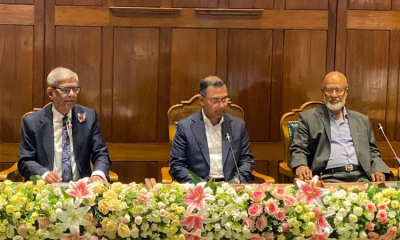Mehedi Al Amin from Dubai, UAE
Experts and environmentalist urge the global community to stop the production and use of plastic products periodically and adopt zero waste strategies, in an event at waste and resources pavilion of International Solid Waste Association (ISWA) at COP28.
This year COP28 is happening in Dubai of United Arab Emirates.
The event titled “Mitigating climate change and improving public health through zero waste strategies” was organized by Global Alliance for Incineration Alternatives (GAIA) and Abt Associates.
Speakers said that plastic emits greenhouse gases throughout its entire lifecycle, even in the recycling phase. Moreover, it emits methane gas from the landfill. Thus, the remedy is to shift towards zero waste strategies.
Dr Shahriar Hossain, Secretary General of the Environment and Social Development Organization (ESDO) presented the Keynote paper. ESDO is a member organization of GAIA.
Shahriar said, “There is no way to escape from the carbon emission without stopping its production and use. We need to adopt zero-waste strategies and periodic bans on plastic products.
In his presentation, he showed, “Throughout their lifecycle, plastics have a significant carbon footprint and emit 3.4% of global greenhouse gas emissions. Emissions from plastic lifecycle will more than double between 2019 and 2060. In 2019, it was 1.8 gigatons which will reach 4.3 gigatons in 2060.
Moreover, 2 million tonnes of methane is released into the atmosphere from landfills worldwide.
Shahriar said, “More than 16 million tonnes of carbon dioxide gas are emitted during the recycling process of plastic waste annually. Of them, 5.9 million tonnes were added only from the USA.
Along with the production and conversion phase, it adds greenhouse gas to the atmosphere at the end of life during incineration, recycling, and landfill. Even the recycling is not enough.
Plastic has serious health hazards. Some 13,000 chemicals are used during the production and manufacturing of plastic products which causes environmental contamination, and harm to public health and climate.
Some chemicals are linked to hormone disruption and reproductive health problems, some are linked with breast cancer and puberty while some chemicals are linked to other cancers.
Shahriar advised scientific evidence-based solutions, banning production and use of single-use along with fostering the transition to zero-waste communities.
He suggested implementing extended producer responsibility and polluters pay principle, adopting and enforcing ambitious targets to reduce greenhouse gas emissions.
ISWA president Carlos Silva Filho and president director of CENTCOOP Aline Sousa da Silva spoke among others and moderated by Amy Rowland, Senior analyst of abt Associates.








-20251226051932.jpeg)
-20251222051606.jpeg)



-20260217073221.webp)




-20260216115008.webp)



















